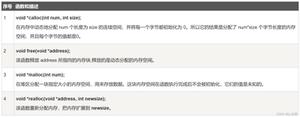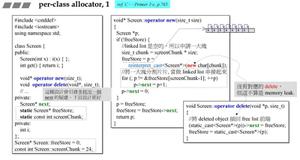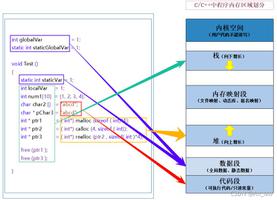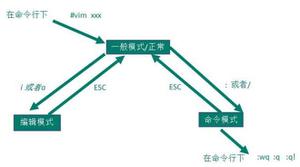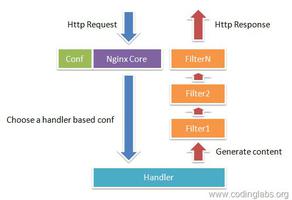【原创】(十五)Linux内存管理之RMAP

背景
Read the fucking source code!--By 鲁迅A picture is worth a thousand words.--By 高尔基
说明:
- Kernel版本:4.14
- ARM64处理器,Contex-A53,双核
- 使用工具:Source Insight 3.5, Visio
1. 概述
RMAP反向映射是一种物理地址反向映射虚拟地址的方法。
映射
页表用于虚拟地址到物理地址映射,其中的
PTE页表项记录了映射关系,同时struct page结构体中的mapcount字段保存了有多少PTE页表项映射了该物理页。反向映射
当某个物理地址要进行回收或迁移时,此时需要去找到有多少虚拟地址射在该物理地址,并断开映射处理。在没有反向映射的机制时,需要去遍历进程的页表,这个效率显然是很低下的。反向映射可以找到虚拟地址空间
VMA,并仅从VMA使用的用户页表中取消映射,可以快速解决这个问题。
反向映射的典型应用场景:
kswapd进行页面回收时,需要断开所有映射了该匿名页面的PTE表项;- 页面迁移时,需要断开所有映射了该匿名页面的PTE表项;
2. 数据结构
反向映射有三个关键的结构体:
struct vm_area_struct,简称VMA;VMA我们在之前的文章中介绍过,用于描述进程地址空间中的一段区域。与反向映射相关的字段如下:
struct vm_area_struct {...
/*
* A file's MAP_PRIVATE vma can be in both i_mmap tree and anon_vma
* list, after a COW of one of the file pages. A MAP_SHARED vma
* can only be in the i_mmap tree. An anonymous MAP_PRIVATE, stack
* or brk vma (with NULL file) can only be in an anon_vma list.
*/
struct list_head anon_vma_chain; /* Serialized by mmap_sem &
* page_table_lock */
struct anon_vma *anon_vma; /* Serialized by page_table_lock */
...
}
struct anon_vma,简称AV;AV结构用于管理匿名类型VMAs,当有匿名页需要unmap处理时,可以先找到AV,然后再通过AV进行查找处理。结构如下:
/* * The anon_vma heads a list of private "related" vmas, to scan if
* an anonymous page pointing to this anon_vma needs to be unmapped:
* the vmas on the list will be related by forking, or by splitting.
*
* Since vmas come and go as they are split and merged (particularly
* in mprotect), the mapping field of an anonymous page cannot point
* directly to a vma: instead it points to an anon_vma, on whose list
* the related vmas can be easily linked or unlinked.
*
* After unlinking the last vma on the list, we must garbage collect
* the anon_vma object itself: we're guaranteed no page can be
* pointing to this anon_vma once its vma list is empty.
*/
struct anon_vma {
struct anon_vma *root; /* Root of this anon_vma tree */
struct rw_semaphore rwsem; /* W: modification, R: walking the list */
/*
* The refcount is taken on an anon_vma when there is no
* guarantee that the vma of page tables will exist for
* the duration of the operation. A caller that takes
* the reference is responsible for clearing up the
* anon_vma if they are the last user on release
*/
atomic_t refcount;
/*
* Count of child anon_vmas and VMAs which points to this anon_vma.
*
* This counter is used for making decision about reusing anon_vma
* instead of forking new one. See comments in function anon_vma_clone.
*/
unsigned degree;
struct anon_vma *parent; /* Parent of this anon_vma */
/*
* NOTE: the LSB of the rb_root.rb_node is set by
* mm_take_all_locks() _after_ taking the above lock. So the
* rb_root must only be read/written after taking the above lock
* to be sure to see a valid next pointer. The LSB bit itself
* is serialized by a system wide lock only visible to
* mm_take_all_locks() (mm_all_locks_mutex).
*/
/* Interval tree of private "related" vmas */
struct rb_root_cached rb_root;
};
struct anon_vma_chain,简称AVC;AVC是连接VMA和AV之间的桥梁。
/* * The copy-on-write semantics of fork mean that an anon_vma
* can become associated with multiple processes. Furthermore,
* each child process will have its own anon_vma, where new
* pages for that process are instantiated.
*
* This structure allows us to find the anon_vmas associated
* with a VMA, or the VMAs associated with an anon_vma.
* The "same_vma" list contains the anon_vma_chains linking
* all the anon_vmas associated with this VMA.
* The "rb" field indexes on an interval tree the anon_vma_chains
* which link all the VMAs associated with this anon_vma.
*/
struct anon_vma_chain {
struct vm_area_struct *vma;
struct anon_vma *anon_vma;
struct list_head same_vma; /* locked by mmap_sem & page_table_lock */
struct rb_node rb; /* locked by anon_vma->rwsem */
unsigned long rb_subtree_last;
#ifdef CONFIG_DEBUG_VM_RB
unsigned long cached_vma_start, cached_vma_last;
#endif
};
来一张图就清晰明了了:
- 通过
same_vma链表节点,将anon_vma_chain添加到vma->anon_vma_chain链表中; - 通过
rb红黑树节点,将anon_vma_chain添加到anon_vma->rb_root的红黑树中;
2. 流程分析
先看一下宏观的图:
- 地址空间
VMA可以通过页表完成虚拟地址到物理地址的映射; - 页框与
page结构对应,page结构中的mapping字段指向anon_vma,从而可以通过RMAP机制去找到与之关联的VMA;
2.1 anon_vma_prepare
之前在page fault的文章中,提到过anon_vma_prepare函数,这个函数完成的工作就是为进程地址空间中的VMA准备struct anon_vma结构。
调用例程及函数流程如下图所示:
至于VMA,AV,AVC三者之间的关联关系,在上文的图中已经有所描述。
当创建了与VMA关联的AV后,还有关键的一步需要做完,才能算是真正的把RMAP通路打通,那就是让page与AV关联起来。只有这样才能通过page找到AV,进而找到VMA,从而完成对应的PTE unmap操作。
2.2 子进程创建anon_vma
父进程通过fork()来创建子进程,子进程会复制整个父进程的地址空间及页表。子进程拷贝了父进程的VMA数据结构内容,而子进程创建相应的anon_vma结构,是通过anon_vma_fork()函数来实现的。
anon_vma_fork()效果图如下:
以实际fork()两次为例,发生COW之后,看看三个进程的链接关系,如下图:
2.3 TTU(try to unmap)和Rmap Walk
如果有page被映射到多个虚拟地址,可以通过Rmap Walk机制来遍历所有的VMA,并最终调用回调函数来取消映射。
与之相关的结构体为struct rmap_walk_control,如下:
/* * rmap_walk_control: To control rmap traversing for specific needs
*
* arg: passed to rmap_one() and invalid_vma()
* rmap_one: executed on each vma where page is mapped
* done: for checking traversing termination condition
* anon_lock: for getting anon_lock by optimized way rather than default
* invalid_vma: for skipping uninterested vma
*/
struct rmap_walk_control {
void *arg;
/*
* Return false if page table scanning in rmap_walk should be stopped.
* Otherwise, return true.
*/
bool (*rmap_one)(struct page *page, struct vm_area_struct *vma,
unsigned long addr, void *arg);
int (*done)(struct page *page);
struct anon_vma *(*anon_lock)(struct page *page);
bool (*invalid_vma)(struct vm_area_struct *vma, void *arg);
};
取消映射的入口为try_to_unmap,流程如下图所示:
基本的套路就是围绕着struct rmap_walk_control结构,初始化回调函数,以便在适当的时候能调用到。
关于取消映射try_to_unmap_one的详细细节就不进一步深入了,把握好大体框架即可。
以上是 【原创】(十五)Linux内存管理之RMAP 的全部内容, 来源链接: utcz.com/z/512516.html

